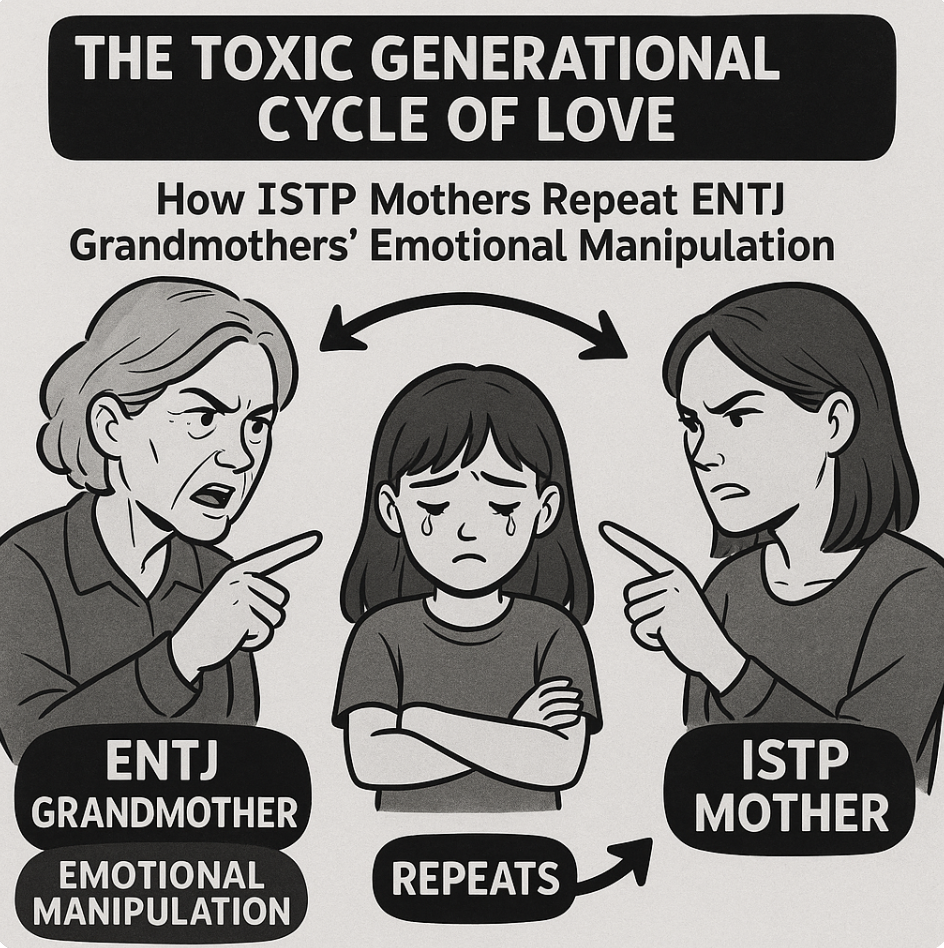The Toxic Generational Cycle of Love: How ISTP Mothers Repeat ENTJ Grandmothers' Emotional Manipulation

The Formulaic “Love” of an ISTP Mother: When Birthday Rituals Replace Emotional Connection
Familial love often follows unspoken rules—some healthy, others deeply dysfunctional. The Chinese proverb “Every monkey has its own leash” perfectly captures how generational patterns of emotional manipulation replicate themselves. In this case, an ENTJ grandmother’s calculated “birthday rituals” became the leash controlling her ISTP daughter, who then attempted—and failed—to apply the same hollow formula to her own child.
The ENTJ Grandmother’s Manipulative Blueprint
The grandmother, likely an ENTJ (Commanders are known for their strategic, domineering traits), weaponized ritualistic care to ensure compliance. By performing exaggerated birthday gestures—like delivering a home-raised chicken from the countryside—she created an illusion of devotion. In reality, this was transactional: one day of performative affection bought a year of subservience.
Her daughter (the ISTP mother) internalized this warped logic. As an ISTP (Virtuosos are pragmatic, emotionally detached, and action-oriented), she reduced love to a checklist: Remember the birthday → Fulfill obligation → Expect loyalty. The grandmother’s ENTJ charisma made the manipulation effective, but the ISTP mother lacked the same finesse.
The ISTP Mother’s Flawed Replication
ISTPs prioritize efficiency over emotional nuance. When the mother replicated the “birthday leash” on her own child, she skipped the grandmother’s crucial ingredient: effort. Instead of heartfelt gestures, she offered cash—a hollow imitation.
Key failures:
Misaligned Intentions: The grandmother’s rituals were strategic; the mother’s were habitual. One manipulated, the other mimicked.
Emotional Illiteracy: ISTPs often struggle with abstract emotions. The mother genuinely believed money = love because tangible rewards aligned with her pragmatic worldview.
Cultural Blind Spots: Forcing lunar calendar birthdays ignored the child’s actual preferences—revealing a focus on tradition over connection.
The ENFP Child’s Awakening
The narrator, an ENFP (Campaigners are idealistic and crave authentic bonds), initially mistook the ritual for love. But ENFPs detect incongruence quickly. The realization? This isn’t love—it’s a免责程序 (liability waiver).
The grandmother’s ENTJ tactics worked because she tailored them to the ISTP’s psychology. The mother’s half-hearted version failed because:
ENTJs refine methods for maximum control; ISTPs copy without understanding why.
ENFPs reject performative bonds; they need genuine emotional engagement.
Breaking the Cycle: Why the ENFP Walks Away
The narrator refuses to “rescue” their mother, recognizing the hierarchy:
ENTJ Grandmother: Apex predator, manipulating through charm and precision.
ISTP Mother: Submissive to superiors (her mother) but oppressive to inferiors (her child).
The ENFP’s survival instinct kicks in: Why save someone who’d sacrifice me for approval? ISTPs and ENTJs share a transactional worldview; the ENFP’s empathy has no place in this ecosystem.Lessons for MBTI-Driven Relationships
- ISTPs must interrogate why they follow traditions—are they meaningful, or just inherited scripts?
- ENTJs should audit their influence: Control isn’t leadership.
- ENFPs/NF Types: Protect your emotional energy. Not all family bonds are worth saving.
Final Insight: Love isn’t a formula. Real connection requires more than a calendar reminder and a cash gift—it demands presence, adaptability, and the courage to break toxic cycles.
—
For more on MBTI and dysfunctional family dynamics, explore ProMbti’s guides on Emotional Intelligence and type-specific boundaries.




